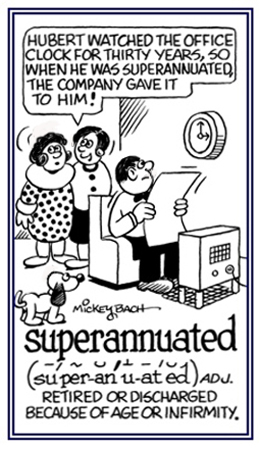obsolesc-, obsolescent-, obsolet-
(Latin: to wear out, to grow old; to fall into disuse; to grow out of use; elderly, older)
obsolesce (ahb" suh LES) (verb), obsolesces; obsolesced; obsolescing
1. To become old; to fall into disuse: This word has not obsolesced, yet, but it is rarely used these days.
2. That which is or is becoming outmoded: According to some sources, people are obsolescing the use of many words these days.
2. That which is or is becoming outmoded: According to some sources, people are obsolescing the use of many words these days.
1. The process of falling into disuse or becoming out of date: Obsolescence frequently takes place because a replacement has become available which is more advantages compared to the disadvantages incurred by using or repairing the original system.
2. A loss in the utility or value of property that results over time from intrinsic limitations; such as, outmoded facilities or external circumstances: Obsolescence is usually distinguished from depreciation and physical deterioration.
4. Synonyms of obsolescence: on the way out, passing out of use, disappearing, fading, waning, on the wane, dying.
2. A loss in the utility or value of property that results over time from intrinsic limitations; such as, outmoded facilities or external circumstances: Obsolescence is usually distinguished from depreciation and physical deterioration.
Economic obsolescence results from external factors; such as, location that renders a property of no longer being competitive, or is unattractive to purchasers or investors, or of decreasing usefulness.
Functional obsolescence derives from a lack of adequate or appropriate equipment, space, or design.
3. In medicine, the termination or the beginning of the end of any physiological process.4. Synonyms of obsolescence: on the way out, passing out of use, disappearing, fading, waning, on the wane, dying.
obsolescent (adjective), more obsolescent, mostobsolescent
1. Relating to passing out of use, as a word: Henry was using an obsolescent term to describe what had happened before he went to the doctor.
2. Descriptive of being outdated or outmoded, as machinery or weapons.
3. In biology, gradually disappearing; imperfectly or only slightly evolving: An obsolescent development of an organ or other part of an animal or a plant.
2. Descriptive of being outdated or outmoded, as machinery or weapons.
3. In biology, gradually disappearing; imperfectly or only slightly evolving: An obsolescent development of an organ or other part of an animal or a plant.
obsolescently (adverb), more obsolescently, most obsolescently
Describing the process of passing out of service or usefulness.
obsolete (adjective), more obsolete, most obsolete
1. A reference to being old; no longer beneficial, valid, or fashionable.
2. Relating to something that is superseded by a newer item, although the previous one is possibly still in use.
3. A description of a part or organ of an animal or plant that is undeveloped or no longer functional.
4. Pertaining to words, equipment, etc., that are no longer active are gone into disuse: There are obsolete things which are replaced by something that is newer.
5. Synonyms of obsolete: ancient, antiquated, antique, archaic, disused, neglected, old, old-fashioned, out of date, discontinued, defunct, outmoded, and superannuated.
6. Etymology: from Latin obsoletus, "grown old, worn out"; past participle of obsolescere, "to wear out, to grow old, to fall into disuse"; probably from ob-, "away" + solere, "to be accustomed to".

© ALL rights are reserved.
Go to this Word A Day Revisited Index
2. Relating to something that is superseded by a newer item, although the previous one is possibly still in use.
3. A description of a part or organ of an animal or plant that is undeveloped or no longer functional.
4. Pertaining to words, equipment, etc., that are no longer active are gone into disuse: There are obsolete things which are replaced by something that is newer.
5. Synonyms of obsolete: ancient, antiquated, antique, archaic, disused, neglected, old, old-fashioned, out of date, discontinued, defunct, outmoded, and superannuated.
6. Etymology: from Latin obsoletus, "grown old, worn out"; past participle of obsolescere, "to wear out, to grow old, to fall into disuse"; probably from ob-, "away" + solere, "to be accustomed to".

Go to this Word A Day Revisited Index
so you can see more of Mickey Bach's cartoons.
obsoletely (adverb), more obsoletely, most obsoletely
1. Relating to being no longer in use or no longer functional; of a kind or style no longer current; old-fashioned.
2. With reference to a plant or animal part, indistinct or imperfect as compared with a corresponding part in related organisms; that are too small or imperfectly developed in comparison to others that are more fully developed in an earlier stage of the individual, in a past generation, or in closely related forms.
2. With reference to a plant or animal part, indistinct or imperfect as compared with a corresponding part in related organisms; that are too small or imperfectly developed in comparison to others that are more fully developed in an earlier stage of the individual, in a past generation, or in closely related forms.
A condition in which something is out of date and is no longer in current service.
A disused word or phrase; an archaism which is no longer utilized: Obsoletism is a word, expression, practice, or method from an earlier time that is no longer used, or the use of expressions, techniques, and fashions from an earlier period of time.
<img src="/img/left_arrow_sm.gif" alt="" /> <img src="/img/right_arrow_sm.gif" alt="" />
Showing 1 page of 8 main-word entries or main-word-entry groups.
